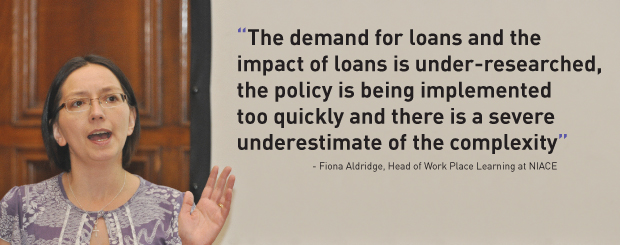Toni Pearce was reelected as VP for FE
Over 1,500 students from across educational institutions in the UK descended upon Sheffield’s City Hall to attend the National Union of Students (NUS)flagship National Conference.
National conference is the sovereign body of the NUS and sees delegates electing their representatives and policy for the forthcoming academic year. A raft of policy was debated and approved by delegates regarding the Union’s political stance on various aspects of further education (FE).
Celebrating 90 years since its formation, the NUS, has often been criticised for its prioritisation of more higher education related campaigns. However in recent years efforts have been made by many to raise the profile of FE within the NUS and to more ferociously campaign on the issues that the FE membership mandate the Union with.
On day two of the conference Toni Pearce was re-elected in a landslide victory to the office of vice president further education for the NUS.
Pearce, formally President of Cornwall College Students’ Union, was elected in the first round of voting, securing 127 of 199 votes. Her opponent Jamil Keating received 69 votes and “re-open nominations” three.
Speaking during the election’s hustings on the second day of conference, Pearce said: “NUS must move forward with our narrative of a fair, high quality tertiary education system for all, based on parity of esteem between academic and vocational, supported by genuinely independent information advice and guidance and properly funded by the state.”
Following on from the ballot of FE delegates and her re-election in Sheffield, Pearce explained to FE Week the mandate that she has been given by her membership for the forthcoming year.
We are witnessing an entire generation of young people not just being forgotten by their government, but being completely abandoned”
“I am overwhelmed that the FE membership has given me the opportunity to once again represent FE students. My first term has thrown at me many challenges and our movement begun the fight to protect our sector and students. From the harsh withdrawal of EMA to the proposed removal of the Care to Learn grant. We have only seen what two years of this Coalition Government has done to the sector, we have another three.”
Pearce went on to declare that her second term will be one where she leads the Union’s refocus to those who are the most vulnerable.
“We are witnessing an entire generation of young people not just being forgotten by their government, but being completely abandoned. Successive governments have attempted to pull the rug from under young people, and maybe they’ve almost been successful. But I absolutely refuse to sit back and accept it. Last year we were successful in our campaign to prevent the withdrawal of Care to Learn and I am determined that we are mobilise our Unions once more to protect those that are most vulnerable.”
During the conference the 1,500 delegates mandated the Union with plethora of new policies that it must act upon during the forthcoming academic year. The further education zone committee proposed several polices which sanctioned stances on Ofsted, Student Governors, Offender Learning and called for the implementation of independent complaints and appeals procedure outside of internal institutional structures; similar to the OIA in Higher Education.
Delegates also debated the Union’s approach to the government’s White Paper on higher education reforms leading to a vote calling for the resignation of David Willets, the universities and science minister. The conference delegates also voted to hold a national demonstration against the government’s reforms in the first term of the 2012-13 academic year; a demonstration that is expected to involve thousands of FE students; in opposition to government cuts in education.

The NUS Annual Conference was held at Sheffield City Hall Liam Burns was reelected as President of the NUS
Keep FE Free campaign launched by NUS
On the first day of its National Conference on Tuesday, NUS launched its latest FE campaign – Keep FE Free; its campaign against the introduction of fees and student loans for adults in further education in England.
The campaign launch featured as part of a fringe event during the conference discussing the government’s proposal of introducing a system of student loans; similar to tuition fee loans in HE. This introduction of loans is to offset the governments planned withdrawal of the current 50 per cent subsidy for level 3 qualifications for those over 24 years old.
The vice president of NUS, Toni Pearce opened the fringe by providing the room, of around 100 FE and HE students, with an introduction to the government’s proposals and why NUS believes the government should “halt progress on the introduction of fees for college students.”
Pearce went on to add that, “under the new regime, adults will face barriers to participation and progression, leaving them with limited education, training and employment opportunities.”
Following on from her opening of the fringe and launch of the campaign; Pearce was joined on the platform by Fiona Aldridge, head of work place learning at the National Institute of Adult Continuing Education (NIACE). Alridge informed the delegates of NIACE’s undertaking of research into the impact the Government’s proposals would have and declared that they “were a high risk strategy.”
Aldridge explained that NIACE in principle supports the policy of learner contributions towards to the cost of their education; however warned that the impact of the current proposal is under-researched.
“We would support in principle that if you can contribute to the cost of your learning then adding private money to public money does increase the provision that can be offered. However, we do think that the demand for loans and the impact of loans is under-researched, that the policy is being implemented too quickly and there is a severe underestimate of the complexity.”
Following on from the remarks of both speakers, delegates were then invited to debate their views on the proposals and were encouraged to lobby their local MP’s. Delegates discussed and shared their own experiences from their Unions. The FE Zone Committee of the NUS has produced post cards with a clear message emblazoned requesting their MP to not support these proposals.
Pearce added: “This cut in funding will be hugely damaging to further education, normally a place where adults can get a second chance if they’ve been failed the first time around. How will adults re-train to find work in the current economic climate? How will they access higher level apprenticeships? And how will they afford Access to HE courses? I and my membership will campaign tirelessly against the implementation of these loans.”



